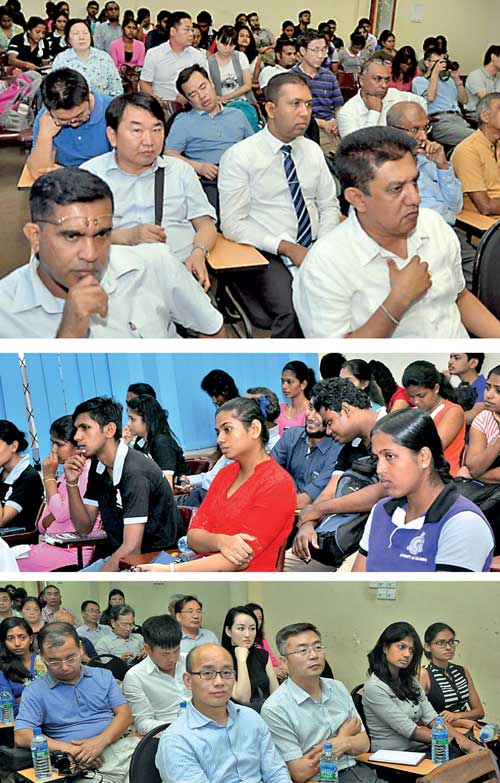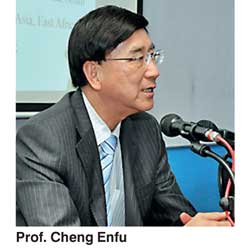Saturday Feb 22, 2025
Saturday Feb 22, 2025
Wednesday, 22 June 2016 00:37 - - {{hitsCtrl.values.hits}}
By Charumini de Silva
With the Indian Ocean being the lifeline of China’s foreign trade, energy and raw material transportation, Sri Lanka will undoubtedly play a crucial role in the strategy of the 21st Century Maritime Silk Road with its unique geographic advantage, Prof. Cheng Enfu, Chairman of the World Association of Political Economy and Academician of Chinese Academy of Social Sciences China, said in Colombo last week.
He made these remarks at ‘The Belt and Road Initiative and the Political Economy of Sri Lanka-China Relations’ symposium organised by Sri Lanka Association for Political Economy (SLAPE), together with the World Association of Political Economy (WAPE) and University of Colombo Department of Economics, recently.
Prof. Enfu emphasised that jointly building the 21st Century Maritime Silk Road with Sri Lanka would gain China more active position in the international trade and investment system within the Indian Ocean region.
Noting that the vision and actions on jointly building Silk Road Economic Belt and 21st-Century Maritime Silk Road was officially issued on 28 March last year, Prof. Enfu said as the maritime meeting-point of the Indian Ocean, the Pacific Ocean, Southeast Asia, and South Asia, Sri Lanka is gradually exhibiting its important strategic significance.
In addition he said that Sri Lanka being an active participant and founding member of the Asia Infrastructure Investment Bank (AIIB), responded positively to China’s concept of building the Silk Road Economic Belt and the 21st-Century Maritime Silk Road.
“China invests Sri Lanka’s infrastructure projects, Sri Lanka participates in the construction of the 21st-Century Maritime Silk Road proposed by China, and the AIIB provides financial support for these activities. Therefore this three-pronged approach will enhance its affects favourably for a China-Sri Lanka Free Trade Agreement (FTA),” Prof. Enfu pointed out.
Accordingly in recent years China and Sri Lanka expanded bilateral mutually beneficial cooperation in various fields, where bilateral trade volume grew rapidly from $1.43 billion in 2007 to $4.56 billion in 2015 and China has become the largest source of foreign investment in Sri Lanka.
“I believe, with the joint efforts of the Governments, enterprises and academics from both sides, China and Sri Lanka will necessarily become a good example of mutually beneficial cooperation in the construction of the 21st-century Maritime Silk Road,” he stressed.
He also pointed that China-Sri Lanka relations were further enhanced with frequent exchanges of high-level visits.
“During the former President Mahinda Rajapaksa’s visit to China in 2013, both countries agreed to upgrade relations to a strategic cooperative partnership, laying a foundation for expanding bilateral cooperation. In September 2014, Chinese President Xi Jinping visited Sri Lanka and during this visit, China and Sri Lanka announced the FTA negotiation and signed bilateral currency swap agreement worth RMB 10 billion Yuan. In March 2015, on the invitation of the China, President Maithripala Sirisena paid a visit to China and held official talks with President Xi Jinping furthering enriched and deepened China-Sri Lanka strategic cooperative partnership,” he explained.
“Sri Lanka recognised the People’s Republic of China in 1950 and formally established diplomatic relations with China in 1957. Since then, China has provided large-scale economic assistance of any type from financial aid to infrastructure construction for Sri Lanka, which has greatly pushed the development of bilateral relations,” he added.
With the continuous improvement of bilateral economic and trade cooperation, the investment from China to Sri Lanka is growing rapidly. “Most of China’s investment projects in Sri Lanka were focused on infrastructure projects and these projects supported Chinese infrastructure companies expand their overseas profits, and lower the impact on industry from slower growth in Chinese domestic investment.”
Adding that there are also certain political risks involved in these investments Prof. Enfu cited Colombo Port City Project as an example. “In March 2015 the newly elected Government of Sri Lanka declared the suspension of Colombo Port City Project, which is the most important cooperation project between China and Sri Lanka as well as the largest Sino-foreign cooperative construction project of the Maritime Silk Road.”
He reiterated that the Maritime Silk Road would generate widespread and enormous influence, no matter which countries would actually participate in the construction of the Maritime Silk Road in the future.
-Pix by Upul Abayasekara
Discover Kapruka, the leading online shopping platform in Sri Lanka, where you can conveniently send Gifts and Flowers to your loved ones for any event including Valentine ’s Day. Explore a wide range of popular Shopping Categories on Kapruka, including Toys, Groceries, Electronics, Birthday Cakes, Fruits, Chocolates, Flower Bouquets, Clothing, Watches, Lingerie, Gift Sets and Jewellery. Also if you’re interested in selling with Kapruka, Partner Central by Kapruka is the best solution to start with. Moreover, through Kapruka Global Shop, you can also enjoy the convenience of purchasing products from renowned platforms like Amazon and eBay and have them delivered to Sri Lanka.
Discover Kapruka, the leading online shopping platform in Sri Lanka, where you can conveniently send Gifts and Flowers to your loved ones for any event including Valentine ’s Day. Explore a wide range of popular Shopping Categories on Kapruka, including Toys, Groceries, Electronics, Birthday Cakes, Fruits, Chocolates, Flower Bouquets, Clothing, Watches, Lingerie, Gift Sets and Jewellery. Also if you’re interested in selling with Kapruka, Partner Central by Kapruka is the best solution to start with. Moreover, through Kapruka Global Shop, you can also enjoy the convenience of purchasing products from renowned platforms like Amazon and eBay and have them delivered to Sri Lanka.